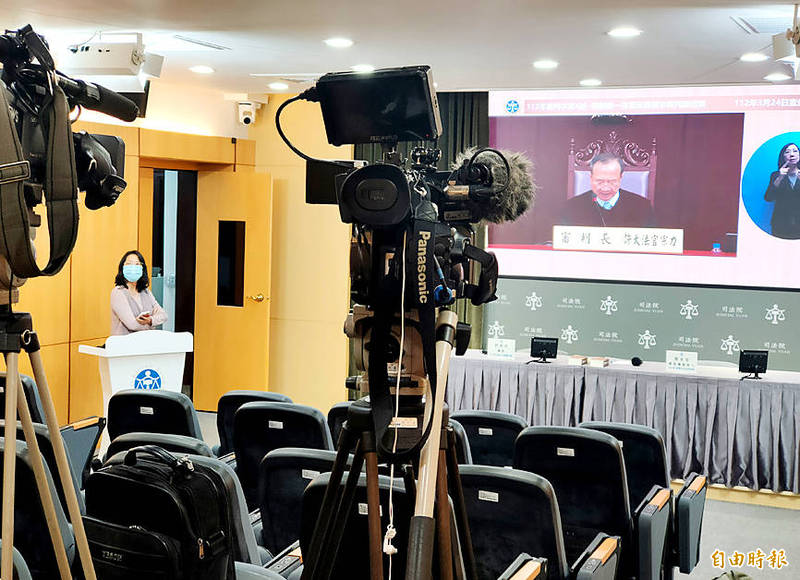Cameras prepare to capture a ruling by the Constitutional Court in Taipei yesterday. Photo: Wang Yi-sung, Taipei Times
FREEDOM OF MARRIAGE: While the law is sound in principle, the Legislative Yuan should amend it to set a limit on its application, the Constitutional Court said
By Jake Chung / Staff writer, with CNA
The Constitutional Court yesterday said that a law barring the “responsible” party from filing for divorce is not flawed in principle, but ordered the Legislative Yuan to better define the clause and provide a statute of limitations.
Article 1,052 of the Civil Code states: “Either the husband or the wife may petition for a juridical decree of divorce ... except if either the husband or the wife is responsible for the event, only the other party may petition for the divorce. "
Kaohsiung Juvenile and Family Court Judge Chu Cheng-kun (朱正坤) and two individuals embroiled in extramarital lawsuits filed for the constitutional interpretation, claiming that the article contravened the legal principle of proportionality.
Legal experts said on condition of anonymity that under the Civil Code, only the person who “is not” or “is less” at fault can file for divorce.
Chu and the others argued that Article 1,052 limits the constitutionally guaranteed right to freedom of marriage.
After reviewing the case, the court ruled that the provision in principle does not contravene the Constitution's guaranteed right of freedom of marriage.
However, it did find the blanket ban barring the party responsible for the act causing the breakdown of the marriage from filing for divorce — regardless of whether it occurred so far in the past that it has exceeded legal memory or how long it continued — might be too strict.
In this sense, the proviso contravenes the freedom of marriage under the Constitution, it said.
The court ordered competent authorities to immediately draft an amendment to the article that would bring it in line with the Constitution and implement it within two years.
Should the amendment take longer than two years to pass, all rulings after March 24, 2025, should observe the spirit of the ruling, the court said.
It suggested that legislators define the “period” after or during an act causing the irreparable breakdown of a marriage for it to be considered as such.
It also suggested that legislators observe similar cases in foreign countries and consider eligible relaxing causes to file for divorce.
The legal system should adapt to the times and make provisions so that the rights of individuals without fault and children still under their care are protected by the law during the divorce process, the ruling said.
Disagreeing with the ruling, Chu said the proviso prevents couples who have already separated in spirit from being able to separate legally.
The Ministry of Justice said the proviso protects the sanctity of marriage, as it prevents any one party from unilaterally dissolving the marriage.
Additional reporting by Wu Cheng-feng
News source: TAIPEI TIMES
